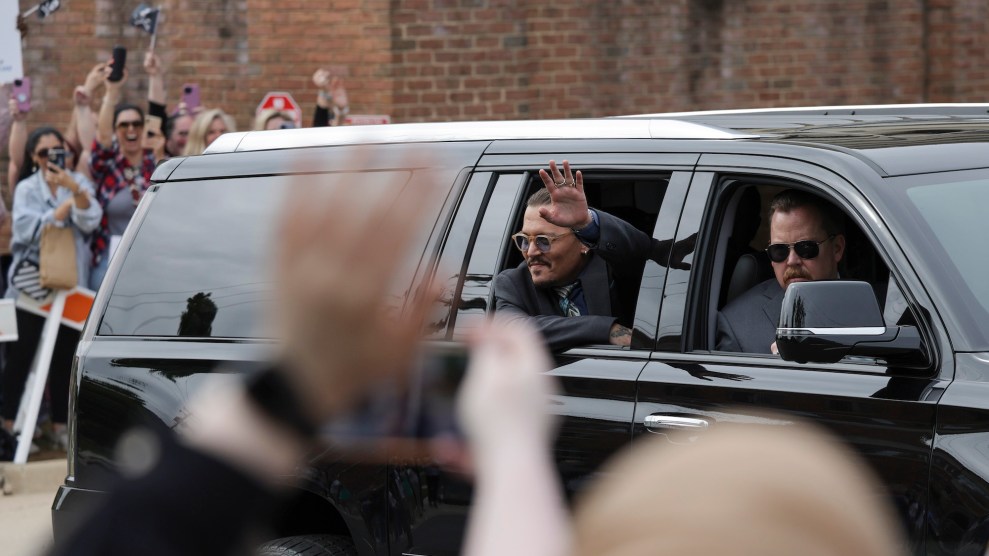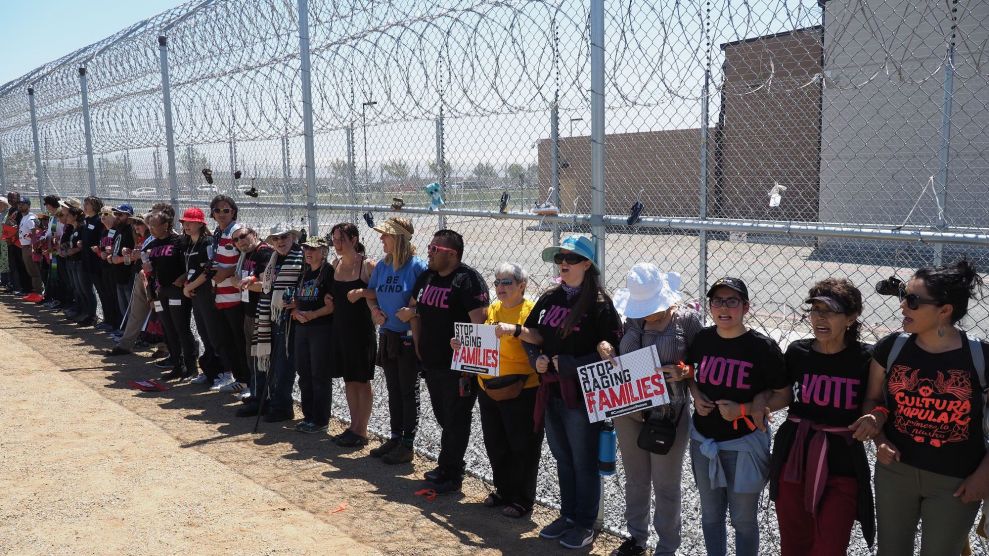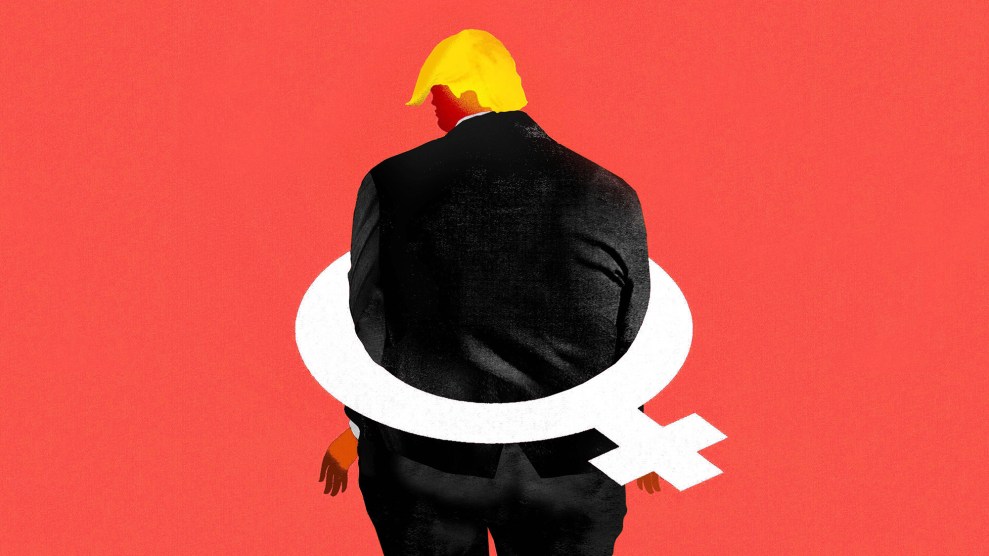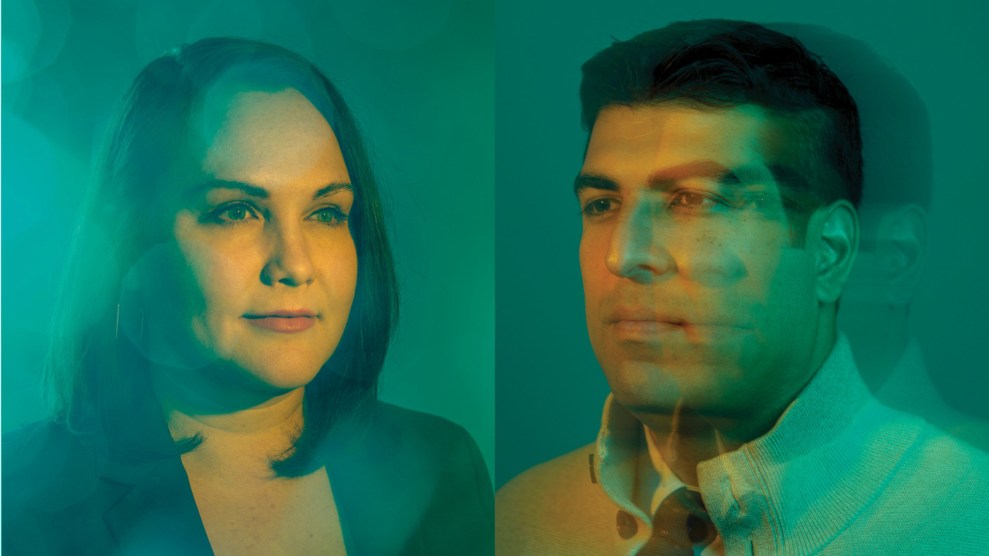
Kevin Dietsch/Getty
In May 2016, when TMZ broke the news that a judge had granted actor Amber Heard a temporary restraining order against her then-husband, Johnny Depp, it took less than a day for the story to get picked up by USA Today, the Today Show, the Guardian, and countless celebrity outlets. The New York Post referred to Depp as a “drunken, paranoid, wine-bottle-flinging wife-beater” in its sensational summary of Heard’s claims as she filed for the protective order. The cover of People magazine showed Heard with bruises around her eyes and a cut lip. The magazine’s cover line promised to take readers “inside their toxic marriage.”
Two years later, after the MeToo movement took off, Heard published her own op-ed in the Washington Post. The article, ghostwritten by an ACLU staffer and timed to coincide with Heard’s new movie Aquaman, called for policy efforts like reauthorizing the Violence Against Women Act, which funds responses to gender-based violence, and opposing new regulations around Title IX that lessened schools’ responsibility to respond to reports of sexual assault and harassment. Heard didn’t explicitly name Depp but referred to her personal experience of having become, in 2016, “a public figure representing domestic abuse.” She continued that she had seen “in real time, how institutions protect men accused of abuse.” The Washington Post’s headline appeared in her tweet about the article: “Amber Heard: I spoke up against sexual violence—and faced our culture’s wrath. That has to change.”
Now, those turns of phrase are at the heart of the six-week televised circus of a trial that has competed with news of mass shootings, the ongoing pandemic, and the war in Ukraine, while flooding social media with anti-Heard hate from Depp’s massive fanbase. He has demanded $50 million in damages for Heard’s statements; she’s filed a $100 million counterclaim alleging that Depp defamed her when his lawyer told the press that her claims of abuse were a “hoax” and an “ambush.” Notably, Depp has already lost a defamation case against the Sun in the UK, where libel laws are friendlier to plaintiffs, after a judge ruled that an article calling him a “wife-beater” was accurate, and that Depp had assaulted Heard on 12 occasions.
Despite common misperceptions, the seven jurors currently deliberating in a Fairfax, Virginia, court are not deciding whether Depp abused Heard, or Heard abused Depp, (or both), but whether her words in the op-ed amounted to “defamation.” Was it false for Heard to say she had become “a public figure representing domestic abuse,” two years after that People magazine cover? Did her language—not her original 2016 allegations, but the implications of her 2018 op-ed—damage Depp’s reputation?
By centering on these questions, the Depp-Heard trial is about issues far deeper than which celebrity is in the wrong. It’s about whether survivors can talk about their experiences without being dragged to court and forced to prove their stories. And while the spectacle is reinforcing the fears of some survivors that coming forward means facing a raft of additional abuse—if not from a celebrity fanbase, then from friends and family—the public sympathy toward Depp is also freeing other survivors to speak: men who have been victims in violent relationships.
You don’t have to join team #IBelieveAmberHeard to recognize that Depp’s lawsuit is part of a trend. Since the MeToo movement five years ago, defamation lawsuits by men accused of sexual misconduct have become a tool of choice for countering allegations—and punishing those who make them. Artists Nelly and Drake, former Pittsburgh Steeler Antonio Brown, and former Tinder CEO Greg Blatt have all filed lawsuits similar to Depp’s. Former Alabama Supreme Court Chief Justice Roy Moore recently lost his defamation lawsuit against Leigh Corfman, one of several women who said Moore had preyed on them when they were underage. (Corfman also lost a suit of her own arguing that Moore’s denials of her story were a kind of defamation.) The actor Evan Rachel Wood was sued for defamation in March by her ex-fiancé, Marilyn Manson—a pal of Johnny Depp’s—whom she says raped and abused her during their relationship.
The trend isn’t limited to celebrities or politicians. In a 2020 investigation, I found dozens of cases involving non-public figures—an airport maintenance chief, a massage therapist, an acroyoga instructor—who filed defamation lawsuits against people who had accused them of sexual misconduct or domestic abuse. One woman was sued after reporting an alleged rape to the police, another after filing a workplace sexual harassment complaint against her manager. As I reported two years ago:
Attorneys confirm that these suits are becoming more common. The Time’s Up Legal Defense Fund, which helps workplace harassment victims pay their legal bills, has assisted 33 accusers, including Lopez, who have been sued for defamation in the past two years—nearly 20 percent of its caseload. As the number of cases grows, so does the chilling effect: Defamation lawsuits are being used “more and more to try to silence people from coming forward,” says Sharyn Tejani, director of Time’s Up. “It was not something that we expected would take as much of our time and money as it has.”
Bruce Johnson, a Seattle lawyer who specializes in First Amendment cases, says that before fall 2017, he was contacted twice a year by women who were worried about being sued if they spoke out about sexual violence or harassment or who were threatened with legal retribution for doing so. Now it’s every two weeks, he says. Alexandra Tracy-Ramirez, a lawyer who represents both survivors and accused perpetrators in campus-related cases in Colorado and Arizona, has also noticed more accusers speaking out and facing the prospect of being sued.
Such suits are particularly common on college campuses, and even among high school students, says Maha Ibrahim, a senior attorney representing young survivors at civil rights litigation firm Equal Rights Advocates. “We represent the ordinary folks, and now they’re the ones getting threatened all the time,” Ibrahim says. “The minute you say you’re a survivor, there’s this concern about defamation.”
Sometimes the cases are only threatened, never filed. Other times, no threat is needed—the fear of legal blowback is enough to keep would-be whistleblowers silent. According to Ibrahim, Equal Rights Advocates has received calls from students as young as 15 who were afraid of being sued for defamation for reporting an assault to their school or going to a Take Back the Night rally. Those fears of legal blowback are rational, Ibrahim explains. Even if a survivor is sure to win a defamation lawsuit, she says, “it’s going to be so expensive and so traumatic to defend yourself, and it’s going to distract so much…that the tables are going to be completely turned. It’s not illogical for survivors to pause and say, ‘Is it worth it to come forward?’”
If lawyers and mainstream advocates were already concerned about the rise of MeToo defamation lawsuits, the extreme vitriol directed at Heard online has shown how powerful such suits can be in harnessing public opinion. On Thursday, Heard testified that she faces death threats every day. A few minutes on a popular YouTube stream of the trial reveals a torrent of gendered abuse in the comments—criticizing Heard for crying or not crying enough, calling her a “gold-digger” and “crazy lunatic woman,” speculating about the smell of her body. “Anybody who is sued by an ex is going to look to this case as what hell awaits them if the matter goes to trial,” says Carrie Goldberg, a victim rights attorney whose firm often defends survivors from defamation claims.
“I was begging Johnny to not make me prove what I’ve had to sit on the stand in front of all of you and prove,” Heard said on the stand last week, explaining a recording of a phone call in which she pleaded with him for a mutual gag order. “I was begging not to do this, not to sit where I’m sitting today. I didn’t want this. I don’t want to be here.”
Ruth Glenn, president and CEO of the National Coalition Against Domestic Violence, has warned that the online tempest surrounding the trial—which is being watched by millions—could have a “chilling effect” on victims of domestic violence as they consider seeking safety or help and weigh the risks of backlash from supporters or family. The takeaway for survivors, according to Glenn: “You will be ridiculed, mocked and further harassed if you come forward, if you say anything.”
That warning resonates with Nomi Abadi, a pianist and composer who told the Hollywood Reporter a few months ago that she’d survived sexual assault in her industry. Abadi, the founder of the Female Composer Safety League, has not revealed publicly who hurt her. “I actually consider it every day, watching this,” Abadi tells me. “Maybe I shouldn’t go public, because people are going to think of me the same way that they think of Amber Heard.”
Abadi says she’s far less interested in the actual court case between Depp and Heard than the public conversation around it. What factors make people more hostile or sympathetic to Heard’s story? “That’s what affects me,” she explains. “How am I supposed to come forward, as a victim who has not come forward yet? How am I supposed to come forward in a post-Amber Heard, Johnny Depp climate?”
Throughout the trial, Depp has maintained that he never assaulted Heard; rather, his legal team argues that she was the primary aggressor in the relationship, abusing him physically, verbally, and emotionally. The public sympathy for this version of the story has resonated powerfully for victims who identify with Depp. “I do think that male victims of domestic abuse are watching this very closely,” says Denise Hines, a George Mason University professor who studies the experiences of male domestic abuse victims. One man who told NBC News that he’d survived domestic and sexual abuse said that after watching Depp testify that Heard had abused him, he opened up about his own experiences to his friends for the first time. Another male victim said seeing a celebrity of Depp’s stature say he was abused made him feel less alone.
According to the CDC, nearly 1 in 7 men experiences severe physical violence by an intimate partner during his lifetime. Yet straight male victims don’t recognize their experiences as abuse, or aren’t aware that agencies that help female survivors also will offer them services, says Emily Douglas, chair of the Department of Social Work & Child Advocacy at Montclair State University. And when they do tell others what they’re going through, Hines says, they’re often met with laughter or asked what they did to deserve it.
So the overwhelmingly sympathetic public reaction to Depp “might open the gates for more sympathy and empathy for male victims,” Hines says. “Men who can relate to the story that Johnny Depp is telling might actually now be more likely to come forward and tell people in their lives what’s going on, or what happened in a previous relationship.”
It may be the only silver lining of a toxic trial that stands to harm many more people than the parties in the courtroom. “The whole trial, unfortunately, does disadvantage female victims because of the vitriol against Amber Heard,” Hines says. “If there’s a male abuser out there who’s watching this and thinks he can use the Johnny Depp trial to his advantage, and paint his girlfriend or wife out to be Amber Heard, the way this is all playing out in the media, he’s going to do it.”
















